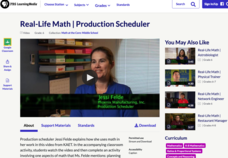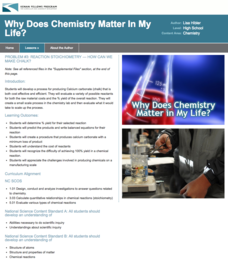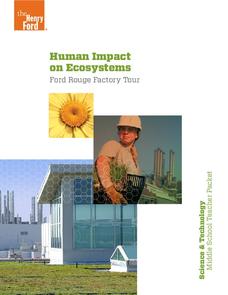Teach Engineering
Design Step 6: Evaluate/Manufacture a Final Product
This is what all of the excitement has been building up to! Young engineers create engineering drawings, use machines to manufacture their products, test, and evaluate their designs in the last step in the engineering design...
Henry Ford Museum
Sustainability: Environmental Management and Responsible Manufacturing
When you think about environmental sustainability, the Ford Motor Company probably isn't the first company to come to mind. A four-lesson unit introduces learners to the idea of sustainability and environmental stewardship. It describes...
Institute of Electrical and Electronics Engineers
A Question of Balance
It's a neat idea, but the task of designing a system for filling jars with consistent specific amounts of a product may be a little out of reach, especially for younger pupils. Intended as an engineering design lesson, this may be better...
Curated OER
The DIY: A Hands-On Look at the New Industrial Revolution
Upper graders explore the new industrial revolution and how the tech boom in recent years is similar and different to the Industrial Revolution of the past. They watch a video, explore web sites, and discuss what they see. They work...
Kenan Fellows
Assembly Required and the Design Process Too!
Do your part to make manufacturing more manageable. A capstone project challenges each group to identify and research a manufacturing process for a product. To complete the activity, they create a presentation for business and community...
California Academy of Science
Your Hidden Water Footprint: Defining a Problem to Find a Solution
One 17-ounce bottle of Cola requires around 46 gallons of water to produce. How is that possible? Young scientists learn about the hidden water used to produce everyday items. They research, discuss, and look for ways to reduce water...
PBS
Real-Life Math — Production Scheduler
Use unit rates to find the number of parts needed to produce a given number of units. A production scheduler shares the different ways schedulers use math to ensure the required amount of parts are available to manufacture air...
Cornell University
Fibers, Dyes, and the Environment
Nanofibers can be made through electrospinning or force spinning in order to reduce the negative impact on the environment. Pupils study the role of fibers and dye on the environment through a series of five hands-on activities. Then,...
Kenan Fellows
Reaction Stoichiometry—How Can We Make Chalk?
What is a reasonable percent yield in the manufacturing process? Scholars develop a process for producing chalk in the third instructional activity of a six-part series. Then, they must determine the theoretical and percent yield....
Kenan Fellows
Assembly Required and the Design Process Too!
An engineering design lesson plan contains connected activities as a capstone engineering project. The activities revolve around the principle of improving an existing object and designing the manufacturing process in order to do so. The...
Curated OER
"Tomorrow and Tomorrow and Tomorrow"
Do you want to live forever? After reading Kurt Vonnegut’s short story, “Tomorrow and Tomorrow and Tomorrow,” class groups adopt the roles of an ethics committee, product manufacturers, concerned scientists, and potential users of an...
Oxfam
Sweatshops - Exploitation Is Never in Fashion
Here's a resource that brings home the idea that we are all part of a global community, that our actions have far reaching consequences. Class members examine the labels in their clothes, create a list of the manufacturers, the countries...
EngageNY
Grade 9 ELA Module 4, Unit 1, Lesson 13
Class members conclude their reading of the supplemental text, “Bangladesh Factory Collapse: Who Really Pays for our Cheap Clothes?” and use the provided Evaluating Argument and Evidence Tool to analyze the evidence Anna McMullen uses to...
EngageNY
Grade 9 ELA Module 4, Unit 1, Lesson 14
As a mid-unit assessment, writers use evidence from the supplemental reading articles "Globalization," "Our Addiction to Fast Fashion Kills," and "Bangladesh Factory Collapse: Who Really Pays for Our Cheap Clothes?" to draft an argument...
EngageNY
Grade 9 ELA Module 4, Unit 1, Lesson 10
What can consumers do to pressure companies to produce "ethically manufactured goods"? Readers examine the evidence Amy Odell uses in the supplemental text "How Your Addiction to Fast Fashion Kills" to support her argument and her...
Beyond Benign
Water Bottle Unit
How much plastic do manufacturers use to create water bottles each year? The class explores the number of water bottles used throughout the years to determine how many consumers will use in the future. Class members compare different...
Nebraska Department of Education
Blue Collar and Proud of It
There is a strong need for workers skilled in trades (agriculture, construction, transportation, the service industry, manufacturing, industry). Middle schoolers listen to an interview with a tradesperson and then go online to...
Kenan Fellows
The Newton Challenge
Make Newton proud. Scholars apply their understanding of forces and energy to an engineering design challenge. They learn about simple machines, create a presentation on Newton's laws, and develop a balloon-powered car.
Institute of Electrical and Electronics Engineers
Conveyor Engineering
Moving along the line. Class members research how a conveyor belt works in order to gain background information. Groups then design a conveyor belt that will carry a piece of candy four feet and along a 90-degree turn. The groups...
Alabama Department of Archives and History
Alabama's New South Era
The industrialization and urbanization of Alabama during the New South era (1865-1914) is the focus of a lesson that asks class members to use primary source documents to examine the impact of industrialization on Alabama workers and...
Advocates for Human Rights
The Right to a Clean Environment in the United States
Even if a school has gone digital, chances are there's still plenty of paper being used. The three activities help scholars learn about the environmental impact of paper and another consumer products of their choosing, the issue of...
Teach Engineering
Design Step 5: Construct a Prototype
Enough with the talking, let's build something! In the fifth step in the engineering design process, young engineers build a prototype to test their ideas. The lesson plan walks them through the process of evaluating it...
Henry Ford Museum
Human Impact on Ecosystems
An environmenta science unit includes three lessons plus a cumulative project covering the ecosystem. Scholars follow the history of the Ford Rouge Factory from its construction on wetlands and how it destroyed the...
Teach Engineering
Edible Rovers
The good thing about building this rover is you get to eat it afterwards. Pairs determine rover parts they want to include in their design based upon their cost and usefulness. The teams design their rovers, build them from edible...
Other popular searches
- Clothing Manufacturing
- Manufacturing Technology
- Drug Manufacturing
- Manufacturing Aids
- Manufacturing Ohio
- Custom Manufacturing
- Manufacturing Projects
- Car Manufacturing
- Advanced Manufacturing
- Manufacturing Materials
- Manufacturing Careers
- Manufacturing Process























